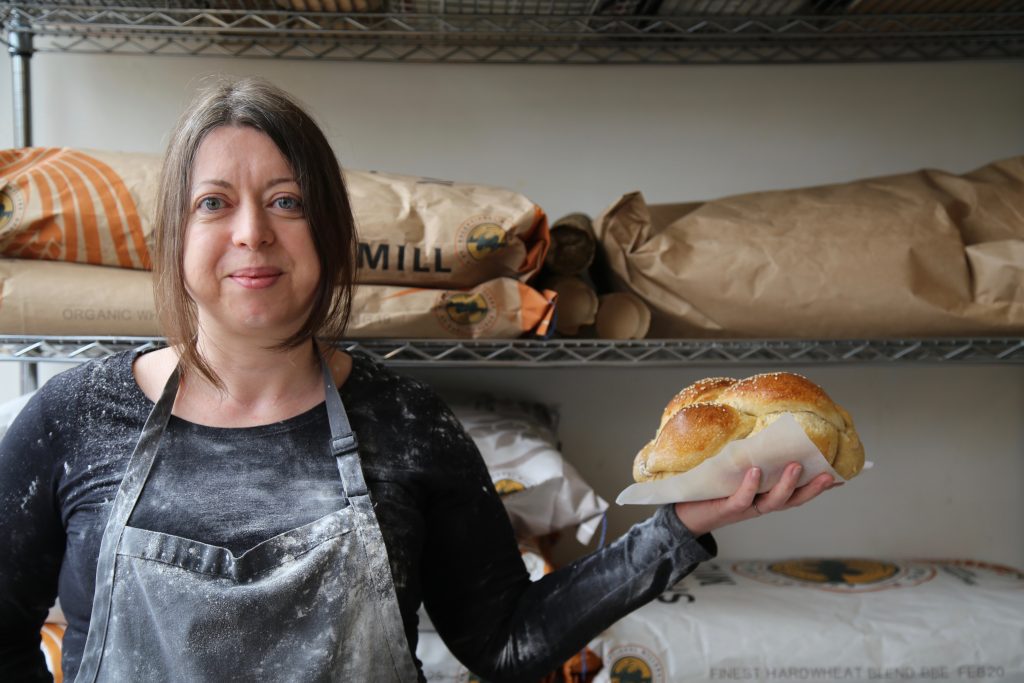
I’ve known Michelle Eshkeri for almost a decade now. We fell out for a bit. It was stupid, and I missed her. She’s always been at the forefront of food trends and can talk knowledgeably about the subject. I also like talking to her about her conversion to Judaism, which took place a decade ago, to coincide with her marriage to Victor. Like many converts, she knows more about the religion than some people born into it.
We even did a Jewish inspired Barbra Streisand supper club together: starting with the Friday night Jewish prayer, passing the kiddush wine and breaking the challah, it was one of the most intense supper clubs I’ve ever hosted. I’m not religious, but I could see that prayer made a difference to the evening. Even if no one celestial was listening, it brought us together and formed a bond between strangers.
Michelle started out making cupcakes as Lavender Bakery. The cupcake industry was rife with competition; wars were waged over icing designs. The soggy bottom fell out of cupcakes: they were too sweet, too big, too blousy and became a byword for a certain kind of girliness that was a bit nauseating and entitled. Cupcakes became more than mere small individual cakes – they encapsulated a type of person, a kind of woman, ‘yummy mummies’, who became despised. Since then, clean eating has filled the same position. Funny how things women like to eat become clichés of hate. You could say that cupcakes were a female way of saying ‘fuck the diet’ that clean-eating reversed back into.
Michelle started to make her own challah, a sourdough version. Hours of testing in her small North London kitchen led to other sourdough bakes: croissants, bagels, babka, all very much influenced by Jewish traditional baking. I also tried one of the best egg sandwiches I’ve ever eaten (and I’m not an egg person).
Margot Bakery was a scary entrepreneurial thing to do, especially for a sole trader woman with two small children. She found a small shopfront in East Finchley, and borrowed around £130k, partly via credit cards, including £30k of equipment, to set it up. There were hurdles aplenty, some of which was caused by men ripping her off, selling her inadequate equipment. She’s had to learn electrics, plumbing and machine repairs.
“When engineers come here to fix something, I now know whether they are telling me the truth. I can talk to them in a language they understand.”
Today Michelle has her own book deal, due to come out this autumn. I visited her at Margot Bakery to chat about her progress.
When I last saw you this was just a dream, an ambition, and now you’ve done it.
I know. Every day I pinch myself.
You sacrificed a more ideal family house to set up this bakery. You wanted to buy a bigger home for your family.
We looked at a flat that we lost because of anti-semitism. At the time Israel was doing something and the owner said because of that he wouldn’t sell us the flat. They hold you responsible for stuff Israel does if you are Jewish. It cost us money for the survey and everything.
Did he pay you back?
No.
To make this happen, I had no trading history, so I couldn’t get a business loan, so we got personal loans.
No help from the family?
None. I wanted to do this by myself. I wanted to show people. It was a collision of things. The boys being a little bit older. I was in the hairdressers, this place was shut for 2 years, but the hairdresser, the wife of the estate agent, knew they were looking for somebody. There were a couple of other offers, so I had 24 hours to get the money together.
So you bought a lease?
Yes. The lease is 12 years.
I took pictures of Michelle. She’s rather shy.
I’m better at talking to people now. Not just one to one, but groups of people.
Why Margot?
I just liked the name. It was feminine and I wanted people to know this bakery was run by a woman. People call me Margot; they think it’s my name. It’s like having an alter ego. Quite useful. A bit like MsMarmite is your alter ego.
Yes, it’s easier to be public if you have another name.
I choose something to eat: there is bread and butter pudding, orange polenta, banana bread with walnuts, croissants….
I try the croissants.
Some people complain that they taste sour. But they are supposed to be that way.
I like the sourdough tang and the tearability.
Your upcoming book is about sourdough.
It’s about sweet sourdough, which is relatively unusual, not many people are doing that. There are a lot of bread books, I’m not saying anything new about bread. I’m telling people the way we make it. We make it the way I like it. Bagels, sweet stuff, sourdough challah, and a bunch of Margot specialities.
How did you get your book deal?
The commissioning editor saw my stuff on Instagram.
She came to the bakery to meet me. I’d been working six days straight and was so tired I could barely articulate. She still gave me a deal! Then I got an agent, so I did it backwards.
Are you doing sourdough pannetone here?
Yes, at Christmas, but our Italian baker that did those has left so I need to get that back on schedule. I’d like to do them all year round. Actually, it’s easier to make them in summer as they rise better.
Is your kitchen not very warm?
No, it’s quite cool. In November we were really struggling to get things to rise in time.
How many staff do you have?
14 including three KPs with seven-day-a-week cover. One part-time baker, three days out of five. Three front of house staff.
What doesn’t exist here is the skill base. You end up paying people more but with less of a skill base. At the moment, there is a lot of competition amongst employers for the very skilled people. My solution is to train people from the bottom up. They stay a year, two years whatever.
Are you training British people, young people?
Yes, the people I’m training right now started as KPs. Training from one position into another position. Also front of house sometimes want to become bakers. I had a higher turnover of staff at the beginning, now it’s more stable.
How did you know how to run the business? Did you have someone advising you?
I started small and slow. We were open every day of the week, which was impossible. I started at six in the morning and didn’t come home till ten at night. I worked proper shifts and then went home and did all the invoices. I didn’t see the children for days at the beginning. I did that solidly for two and a half years. To get myself out, I had to pay more staff to do what I was doing.
To grow you need capacity to grow. If everyone is working at the edge of their hours, they are unhappy and there’s no extra room to take on more customers. I’ve had to scale up the staffing above current sales in order to grow. So I got myself out, so I could write the book, work on the business and see my husband and children.
Who was looking after the children?
My husband’s hours were at the end of the day. We had perfectly complementary jobs for a couple who never wanted to see each other (laughs). He did the mornings and weekends, cos I was at the bakery on the weekends, and I did the school pickup. So between us, we don’t have any child care now.
Do the kids come and work here now?
It’s like an extension of their home. They are 8 and 6. They can bake. But not here, too much equipment around. My husbands brings them after school on Fridays, I’m here all day on Fridays. They go next door and get sweets from the barber.
How many loaves a week?
Friday and Saturday, 200 a day, plus bagels, etc.
Friday and Sunday is about equal. People come from the challah on Friday. It’s a typical north London quality to it. That’s why I like Fridays. It’s sociable. My rabbi comes.
Do you give him a discount?
He wouldn’t accept.
You are at your limit with this.
I hit capacity last year. We cannot do anything more here. For instance, now we are mixing croissant every day.
Selling to restaurants
I notice you are selling to restaurants like ‘Ham’ in West Hampstead.
Have you been?
Not yet.
It’s very good. Also a vegetarian restaurant in Tufnell Park.
They get delivery every day. I use Brisqq to deliver. I also supply Panzers in St John’s Wood and La Fromagerie in Marylebone. They sell our challah. Plus a couple of other cafes, one in Southgate.
Brexit
Brexit has made staffing very difficult. There are less people applying for jobs. If you are an Italian pastry chef, maybe you won’t go to London, you’ll go elsewhere. There’s been a big difference from when I opened and then after the vote it tailed off. It’s pressure on wages, which isn’t a bad thing.
Brexit is really bad for me. I’ve started stockpiling. My suppliers are saying you won’t be able to get butter and chocolate. The problem is about uncertainty.
Everything will be okay in the end. But if there is two years with no certainly, a lot of businesses will go to the wall. If I have a gap in supply, if I can’t make bread because I can’t get flour, my business will go under. I’ve had this before.
When?
When the flour millers Matthews had a cash flow issue and couldn’t buy the grain, which is from Kazakstan. The UK grows most of the flour used here. But organic flour not so much. Organic flour is often grown in Kazakhstan or far away. Now I use Shipton Mill which is mostly UK. Grain is sold on big markets, I guess the Kazakhstan flour is through the EU. I couldn’t get it for eight months to a year. Matthews is really good. We use 500 kilos a week now. So there is only so much space we have to stockpile.
Also it’s a problem for artisanal bakeries, because Hovis or Warburtons can pay higher prices and buy up all the grain. Shipton do look after the smaller bakeries. There is something very lively about Matthews flour, something about the milling process.
Can you get local flour?
Whatever you do, you are going outside of London. The flour I use is fairly local. I need a consistent product, a consistent flour. When I train up new bakers, I can’t keep changing supplier. When you change flour you have to change everything, you change the water, you change fermentation times, everything.
So you have to retest when you have a new flour?
When we got a different croissant flour, a few months back, it took us a few weeks to work through the issues. You give yourself a headache, the customers complain, you have more waste product.
Passover
Passover is when you have to get rid of all the flour in your house?
Yes. Passover is a festival of unleavened bread. It’s not actually about flour but about leavening. Which is a bit at odds with having a sourdough bakery. So Hebrew slaves had to leave Egypt in a hurry and they had to take their bread unleavened. So you can eat flour, matzoh, if it’s been in contact with water for less than 18 minutes. So production of matzoh is rabbinically supervised as having no chance to ferment. Someone is literally watching it, to make sure there is no chance of water having gone near the flour, that’s it’s not even possible for it to ferment. So it’s the antithesis of what we are doing here. So once it hits the water, within 18 minutes it has to go in the oven.
Why 18 minutes?
I have no idea. It’s tradition. It’s just flour and water with holes docked in it. When you eat it you realise how good bread is. If slavery is about going to freedom, you realise that when you are free, you can enjoy good bread.
Jews tell each other stories about this. Unleavened bread is the bread of affliction, of poverty, of fear, of running away. It’s not supposed to taste good.
Surely it fermented en route? if they took dough away in a bag?
The tradition developed later for the retelling of events. It’s unleavened bread because they had no time to let it rise and bake it, they had to leave in a hurry.
Would you take some dough with you if you were escaping? Wouldn’t it be just flour? I’m just interested in the logistics of it.
Food would have been scarce, you just grab anything you have. What would you grab? Marmite?
Definitely.
121 East End Road
London, N2 0SZ
East Finchley
020 8883 6741
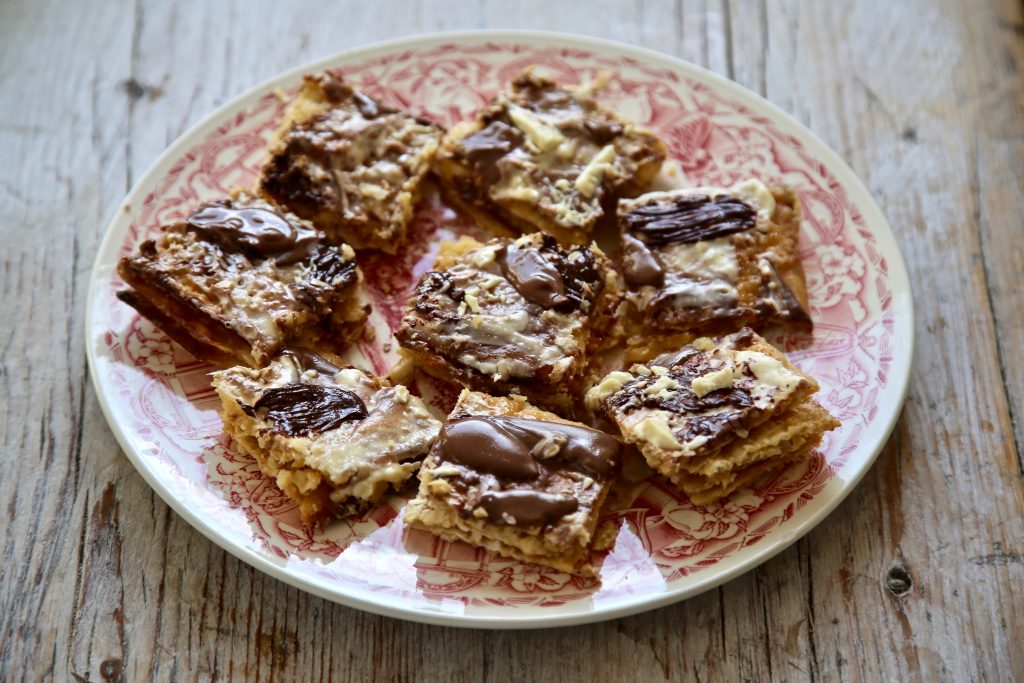
Caramel and chocolate matzoh crunch
Ingredients
- 6 sheets matzoh
- 250 g salted butter
- 200 g golden caster sugar
- 100 g milk chocolate, broken into pieces
- 200 g white chocolate, broken into pieces
- 50 g pistachios or other nuts (optional)
Instructions
- Prepare a baking tray (30 x 30cm), lining it with foil and parchment paper. Fill it with sheets of matzoh.
- Preheat the oven to 180ºC.
- Melt the butter and sugar together in a heavy bottomed saucepan until both the sugar and butter are melted. Keep stirring.
- Pour the caramel over the matzoh and spread with a rubber spatula.
- Put the caramel covered matzoh in the oven and bake for 15 minutes.
- Remove from the oven and scatter the chocolate over the top. Add the nuts, say pistachios, if so desired. Wait until cooled and eat with a cup of tea.

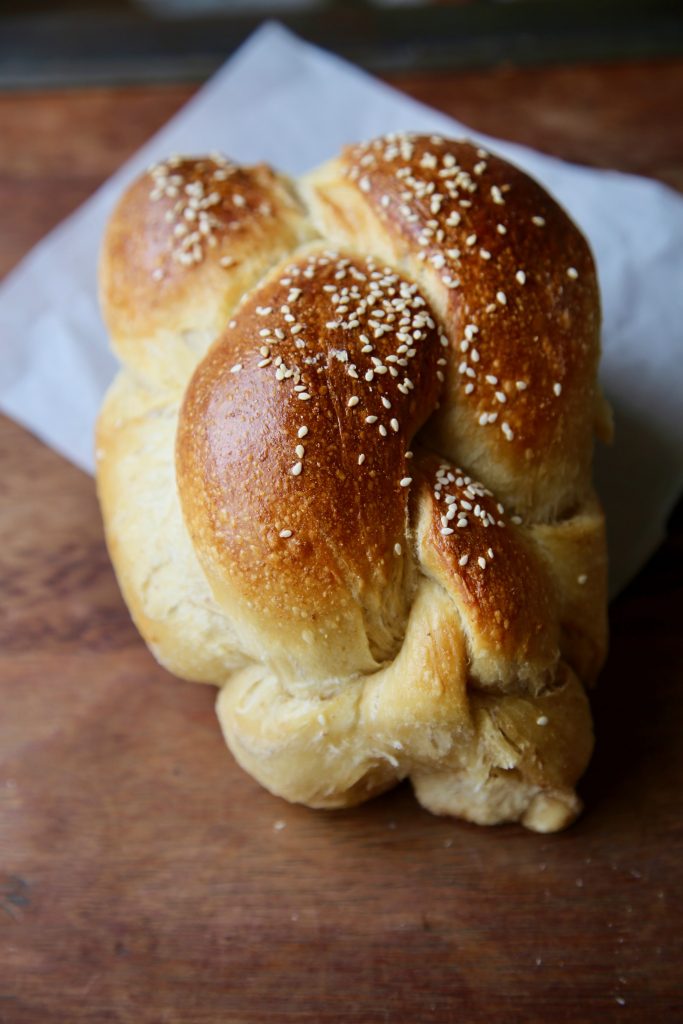
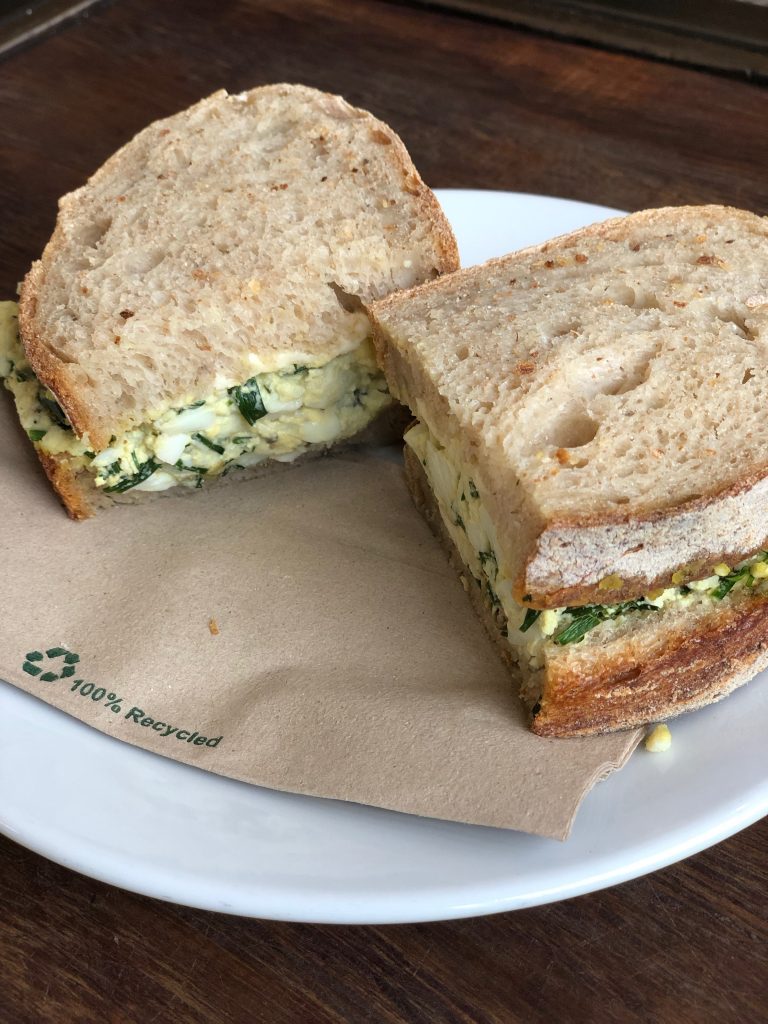
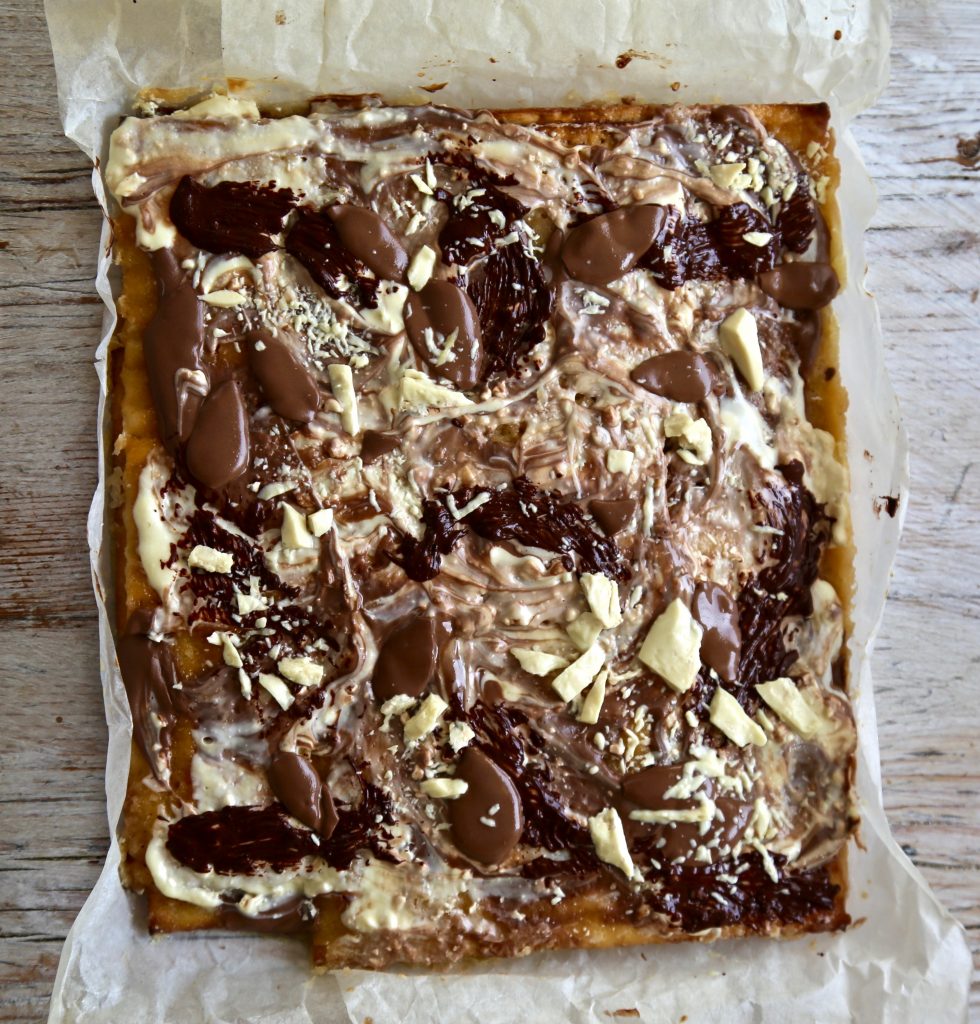
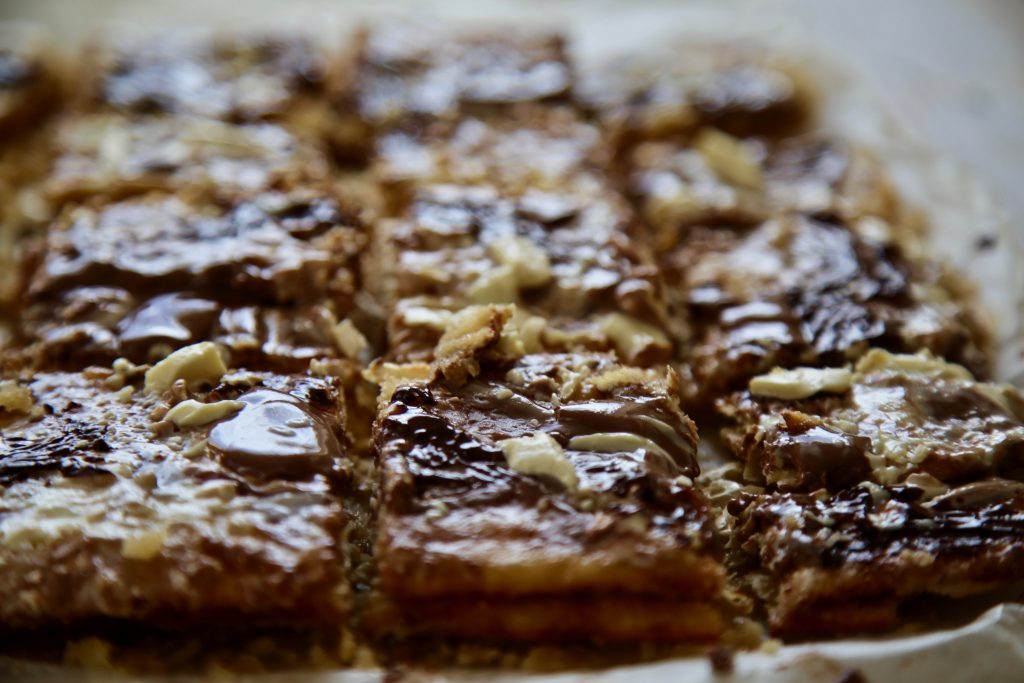



I only just saw this! Love that video so much!! xx